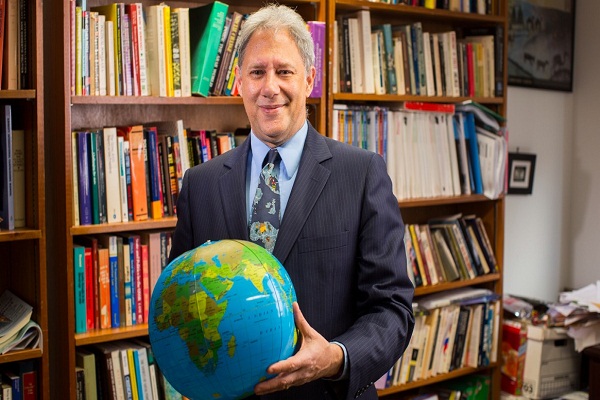Biden Policies Likely to Favor Israeli Positions over Palestinians’: Scholar

“Nonetheless, with increasing support for more just and humane status for Palestinians among Democrats and young people in the US, there might be real effort from Biden’s team to push Israel and the Palestinian authority back to the negotiating table,” David Mednicoff told IQNA in an interview.
Prof. David Mednicoff, JD/PhD is an Associate Professor of Middle Eastern Studies and Public Policy and Chair, Department of Judaic and Near Eastern Studies, University of Massachusetts-Amherst, Amherst, MA USA.
Following is the text of the interview:
IQNA: Joe Biden took office as President of the United States earlier this month. What do you think is his biggest challenge in American foreign policy?
Mednicoff: Biden’s biggest challenge in foreign policy will likely be to re-establish the relevance of the US, and democracies in general, in global politics. Authoritarian political systems, such as China and Russia, have done very well overall during the Trump years. For the sake of basic human rights, diversity, and the ability to address big global challenges like climate change and the economic aftermath of the COVID pandemic, demonstrating once again the soft power of ideals and diplomacy of the world’s most powerful democracy will be crucial.
IQNA: The withdrawal of US troops from Iraq and Afghanistan was one of the Trump administration's major policies in the Middle East. Do you think more US troops will leave the two countries during the Biden administration, given the security challenges in Iraq and Afghanistan?
Mednicoff: There isn’t a perfect or clear answer to this. The pressures within and outside of the US to keep American troops away from Afghanistan and Iraq will continue to be significant, as will the sense that the stabilization of both countries is an important goal for US foreign policy. I expect we’ll see more efforts at a consistent policy in both countries, including support for completing an agreement between the Afghan government and the Taliban, and perhaps some sort of initiative to help de-escalate ethnic and religious tensions in Iraq.
IQNA: In general, how do you assess the Trump administration on foreign policy issues, especially in the Middle East?
Mednicoff: The Trump Administration displayed little zeal or focus in foreign policy, which was a function of former President Trump’s relative lack of knowledge and attention to detail regarding international relations. Because he approached policy in very transactional, interpersonal ways, there was little connection to US values, democracy, rights or consistency. His major legacy was to reduce the role of and respect for the US in the world, as well as the country’s open-ness to immigrants and refugees. The new Biden Administration has already acted to reverse Trump’s disdain for multi-lateralism and international law. However, the Biden Administration will leave intact the US’ more confrontational stance towards China and commitment to Arab-Israeli diplomatic normalization.
IQNA: The process of normalizing relations between some Arab countries and Israel has been widely criticized by Islamic countries that believe the rights of the Palestinians have been violated in these agreements. What are your thoughts about this?
Mednicoff: Arab governments, like most governments, will often emphasize in their foreign policy what they perceive as their strategic interest. Because Israel’s stability, strong economy, and military capabilities line up with, and complement, the resources of (Persian) Gulf Arab states, it is not surprising that covert, and more recently, open connections among these countries have been established. Israel’s links to Arab states have been emerging for a while now. Naturally, these links undermine the diplomatic power and prospects for Palestinians.
IQNA: What do you think about Biden's policy on the Palestinian issue?
Mednicoff: The conventional wisdom is that Biden’s policies will continue to strongly favor Israeli positions over Palestinian ones. Nonetheless, with increasing support for more just and humane status for Palestinians among Democrats and young people in the US, there might be real effort from Biden’s team to push Israel and the Palestinian authority back to the negotiating table. The problem now is that the Israeli government’s long-term efforts to change the demographic balance in the West Bank to make a Palestinian state harder to establish leave the prospects for a reasonable settlement very low. At the very least, I would expect some effort to help Palestinians through increased humanitarian aid and other forms of support to take place under the new Administration.
IQNA: Some believe that Trump's actions against Iran during his last days in office (more sanctions and military moves) aimed to make it harder for the Biden administration to return to a nuclear deal with Iran. What do you think about those moves?
Mednicoff: Clearly, the Trump Administration wanted to make, and has made, a restoration of the nuclear deal more difficult. Nonetheless, I think that the core of the logic behind a deal remains solid for both Tehran and Washington. That is, all posturing aside, based on Biden’s long-term politics and multilateralism, there is every reason to believe that Tehran can have some restoration of international acceptance if it stops nuclear weapons development and cools down some of its foreign policy in the Middle East. I don’t believe that the new Administration would favor aggressive efforts to overthrow Iran’s government.
IQNA: What are your thoughts about the recent events in the US capital and mobs storming the Capitol building in Washington, DC?
Mednicoff: The Capitol riots show that there remain fundamental political divides in the US, which are based primarily on the ease of spreading misinformation in a robust, free society. Addressing this will be a long-term problem. Nonetheless, the (January 20) peaceful transition of government, the inspiration many millions of Americans drew from President Biden’s words of unity, and the multicultural participation in the Inauguration are hopeful signs that the robustness of American political diversity can go along with renewed policies that benefit most of the American people at this challenging moment of national and global history.
Interview by Mohammad Hassan Goodarzi
 Most Commented
Most Commented 


